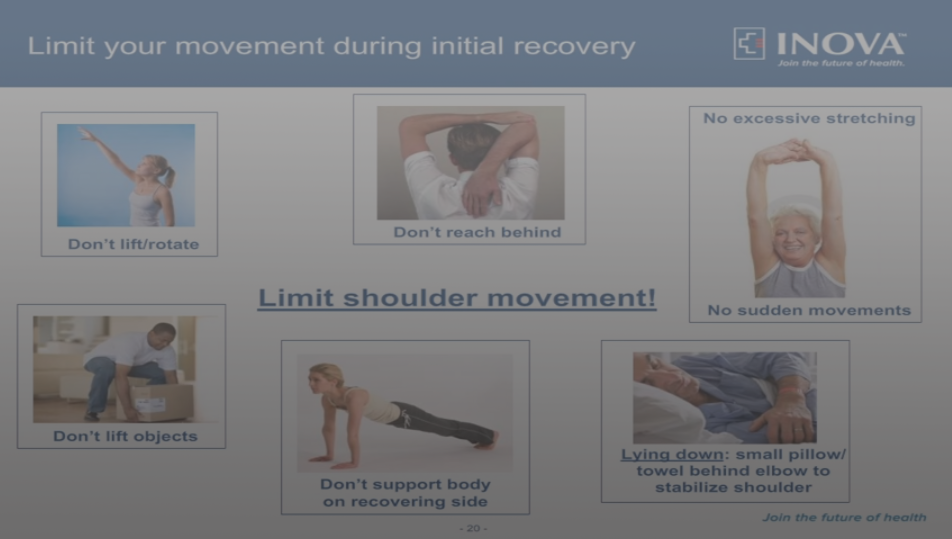Doing your own pre-op research and preparation is very important to ensure the best possible outcome for your shoulder replacement. It is important to familiarize yourself with the surgical procedure and recovery process. Our surgeons and staff strongly recommend that patients (and their coach) watch our shoulder replacement video and complete the online quiz (below).
The video and quiz will help you understand how to prepare for surgery in the following ways:
- Learn more about the procedure
- Educate yourself on the potential complications
- Know what to expect through the recovery process
Before Your Shoulder Surgery
Preparing Your Home
- Place any items you will need on low shelves or tables as it will be difficult to reach high shelves or cupboards after your surgery
- Arrange for someone to help you with daily tasks such as dressing, bathing, cooking and laundry during the first couple of weeks
- Ask your surgeon to recommend an agency for home support, or a rehabilitation facility where you can stay until you become more independent
The Shoulder Replacement Procedure
Shoulder replacement surgery usually takes about two hours. After the procedure, you will be moved to the recovery room where you will remain for several hours while your recovery from anesthesia is monitored. After you wake up, you will be taken to your hospital room.
Recovery
Your medical team will give you several doses of antibiotics to prevent infection. Most patients are able to eat solid food and get out of bed the day after surgery. Some patients are able to go home the day after surgery; others go home the second or third day.
Pain Management
Pain management is an important part of your recovery. After surgery, your care team will provide medication to make you feel as comfortable as possible. Talk with your surgeon if postoperative pain becomes a problem.
Potential Complications
All surgical procedures carry potential risks and complications. Your orthopedic surgeon will explain those associated with shoulder replacement. Complications are rare and most are successfully treatable. They include:
- Infection. Infection may occur in the wound or deep around the prosthesis. It may happen while in the hospital, after you go home or even years later. Minor infections are generally treated with antibiotics. Major or deep infections may require more surgery and removal of the prosthesis. Any infection in your body can spread to your joint replacement.
- Prosthesis problems. Although design and materials continue to evolve, the prosthesis may wear down and the components may loosen or dislocate. This may require additional surgery.
- Nerve injury. Rarely, nerves in the vicinity of the joint replacement may be damaged during surgery. These injuries usually improve over time and symptoms may disappear altogether.
Recovery
Your medical team will give you several doses of antibiotics to prevent infection. Most patients are able to eat solid food and get out of bed the day after surgery. Some patients are able to go home the day after surgery; others go home the second or third day.
Pain Management
Pain management is an important part of your recovery. After surgery, your care team will provide medication to make you feel as comfortable as possible. Talk with your surgeon if postoperative pain becomes a problem.
Rehabilitation
A careful, well-planned rehabilitation program is critical to the success of a shoulder replacement. It will help you regain strength and flexibility more quickly. You’ll start gentle physical therapy soon after the procedure. Your surgeon or physical therapist will provide you with an exercise program to continue at home. If your physician prescribes outpatient physical therapy, Inova Physical Therapy Center offers locations throughout Northern Virginia for the best in expertise and convenience.
After Your Surgery
- Wear the sling provided in the hospital for the first two to four weeks to support and protect your shoulder
- Avoid soaking the wound in water until it has thoroughly sealed and dried; continue to bandage the wound to prevent irritation from clothing
- Follow your home exercise program! It is a critical component of your recovery, particularly during the first few weeks.
- Don’t drive for two to four weeks
Protect Your Shoulder
- Don’t use your arm to push yourself up in bed or from a chair; ask someone to help you
- Don’t overdo it! Pain-free motion may lull you into thinking that you can do more than is prescribed. Early overuse of the shoulder may result in severe limitations later on.
- Don’t lift anything heavier than a glass of water for the first two to four weeks
- Don’t place your arm in any extreme position, such as straight out to the side or behind your body, for the first six weeks

